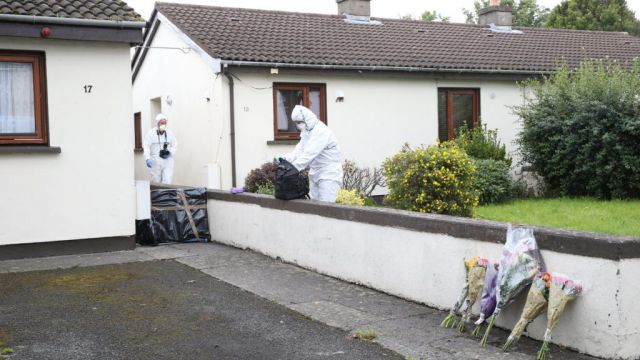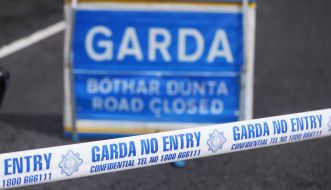A "horrific" and "brutal" machete attack on an elderly man was carried out with "lethal intention" and should result in a murder conviction for the accused man, a prosecution barrister has told a jury at the Central Criminal Court.
Philipp Rahn SC delivered his closing speech on Tuesday in the trial of Patrick McDonagh, who admits killing but denies murdering his neighbour Peter McDonald.
Mr Rahn described a number of slash, chop and stab wounds inflicted with a machete and knife which, he said, proved beyond any reasonable doubt that the accused intended to kill or cause serious injury.
John Fitzgerald SC, for Mr McDonagh, said evidence from a psychiatrist and demonstrated from Mr McDonagh's "bizarre and erratic" behaviour showed his client was suffering from schizophrenia at the time of the incident.
He said the proper verdict is not guilty of murder but guilty of manslaughter, claiming Mr McDonagh's responsibility for the killing was substantially diminished by his mental disorder.
Patrick McDonagh (52), of Whitechapel Road, Clonsilla, Dublin 15, is charged with murdering his next-door neighbour Peter McDonald (73) on Whitechapel Road on July 25th, 2020.
He has pleaded not guilty to murder but guilty to manslaughter. The State has not accepted his plea.
'Sustained and violent attack'
Mr Rahn told the jury that the evidence clearly showed that something had made Mr McDonagh "very angry that night, and it appeared that anger was directed at Peter McDonald".
Counsel asked the jury to consider the nature and extent of the injuries described by State Pathologist Dr Linda Mulligan.
She told the court that Mr McDonald died following a "sustained and violent attack" in which he suffered multiple traumatic injuries, including slash, chop, and stab wounds, most likely from a machete.
Mr Rahn said the most serious injuries were to Mr McDonald's neck, and included a stab wound within a slash wound.
Counsel said this wound "puts to rest" any doubt the jury may have had that Mr McDonagh intended to kill or cause serious injury to the deceased.
He added: "That is not suggestive of a frenzied type of attack or an attack due to intoxication; that is clear proof beyond any reasonable doubt of a lethal intention."
Mr Rahn described it as a "prolonged and sustained" attack which began inside Mr McDonald's home and continued onto the path outside where he died.
He reminded the jury of the evidence of neighbours, including one who said he heard Mr McDonagh threaten Mr McDonald two hours before the fatal attack by saying: "I'm going to kill you."
Mr Rahn asked: "Does that suggest a mindless, random, frenzied attack in the throes of a mental disorder?"
Mr Rahn also suggested that following the killing Mr McDonagh had the "wherewithal" to change his bloody clothes and put them in the washing machine, although he did not switch it on.
Cry for help
He further asked the jury to consider that Mr McDonald called gardaí following an earlier encounter with Mr McDonagh that night.
Within minutes of gardaí leaving his home, neighbours reported hearing Mr McDonald screaming and crying out for help.
"Perhaps it is a coincidence that the garda van leaves, and within a very short period the fatal act occurs," he said to the jury. "These are matters for you."
Mr Rahn also pointed to the evidence of neighbours who said Mr McDonagh "sauntered", with no sign of panic, back to his own home after the attack.
"That is something you can take into account when considering whether that is somebody acting under a mental disorder with a psychotic episode or under the effects of intoxication or whether those are the actions of somebody who has just done something horrific, something brutal, and ended someone else's life and is coming to terms with the outcome of his actions."
Mr Rahn said the evidence of consultant psychiatrist Dr Mary Davoren, who was called by the prosecution, was that the hallucinations Mr McDonagh described to her during interviews after the killing were "strongly associated with malingering and not what you would expect to find in someone with schizophrenia".
Dr Davoren told the jury that she concurred with the findings of a community psychiatric team in Blanchardstown in the early to mid-2010s that Mr McDonagh's behaviour was better explained by substance misuse than by schizophrenia.
Counsel said the evidence shows that Mr McDonagh killed Mr McDonald in a "violent, sustained and merciless attack... leaving him no chance."
He said the defence had not established that at the time of the attack Mr McDonagh was operating under a mental disorder.
"He is not only responsible for killing Mr McDonald but for his murder and a true verdict on the evidence is one of murder," he concluded.
'Outrageous claims'
Mr Fitzgerald, defending, said his client has a lengthy psychiatric history with multiple diagnoses of schizophrenia and schizoaffective disorder.
Over the years, he had made "rather outrageous claims", such as that he was responsible for the attacks on the twin towers in New York or for the death of Britain's Princess Diana.
"This is not something that arrived on the scene in response to events on July 25th, 2020. The strange behaviour and hearing voices is something that long predated this event."
His "erratic and bizarre" behaviour was witnessed by his neighbours, who described him as "crazy", "not right in the head", and said there was "something not right about him", counsel said.
They described him repeatedly blessing himself at a bush, spraying holy water around his garden, and kneeling and blessing himself at a statue in a neighbour's garden, Mr Fitzgerald added.
For 20 years, Mr Fitzgerald said, his client was prescribed antipsychotic medication. "Medication is not a diagnosis," he said, "but you would like to think a person is not going to be prescribed medication for 20 years if there wasn't at least some diagnosis."
There was further evidence, counsel said, that Mr McDonagh's condition deteriorated further in the lead-up to the killing.
In particular, his carer Aaron Murtagh Casey told the trial that Mr McDonagh had suffered a deterioration during the Covid lockdown, while one neighbour reported that the accused's behaviour at that time was "odd even by his standards".
In the hours leading up to the attack, Mr Fitzgerald said there was evidence that Mr McDonagh was "raging against the world".
"He was drawing attention to himself all night in front of his neighbours, roaring and shouting, blessing himself, banging a machete off the wall," counsel said.
Mr Fitzgerald added: "None of this is consistent with any kind of planned killing or clever tactical thinking or anything like that."
He said his client's actions following the killing, including slowly leaving the scene and failing to wash his clothes after putting them in the washing machine, suggest he was confused rather than calm or deliberate.
Emotionally distressed
When armed gardaí spent several hours trying to convince him to leave his house, Mr McDonagh was described by one garda as being in a "very emotionally distressed state", sweating, rocking back and forth while praying and mumbling before a religious picture in his kitchen, the court heard.
Gardaí did not get the impression that his behaviour was "feigned or put on", counsel said.
Mr Fitzgerald reminded the jury of the evidence of Prof Patricia Casey, who said Mr McDonagh was suffering from schizophrenia at the time and that his responsibility for his actions was therefore substantially reduced.
Counsel said the suggestion had been made that Mr McDonagh was a "malingerer or a liar", but he asked the jury to consider how that sits with a mental health history going back to 1999.
"If he's been lying or malingering all those years, it's a hell of a performance," he said.
He described the killing as irrational and "very far from being a planned, cleverly executed killing".
Mr Fitzgerald concluded by saying that, in layman's terms, Mr McDonagh's actions on the night were those of a person "not in their right mind", or as Prof Casey put it, he was "operating under a mental disorder such as to substantially diminish his responsibility".
He told the jury that even if they disagree with Prof Casey, they will have to consider whether Mr McDonagh was so intoxicated that he was unable to form the necessary intent for murder.
In conclusion, Mr Fitzgerald said the evidence is more consistent with Mr McDonagh's plea of manslaughter than with the verdict of murder.
Mr Justice Michael MacGrath will deliver his charge to the jury of nine men and three women on Wednesday.







